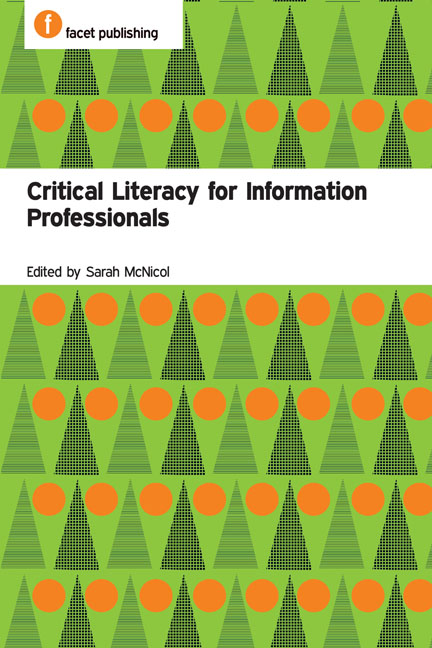Book contents
- Frontmatter
- Contents
- Contributors
- Introduction
- PART 1 THEORIES OF CRITICAL LITERACY
- PART 2 CRITICAL LITERACY IN PRACTICE
- 8 A picture is worth a thousand words: teaching media literacy
- 9 Curricular and extra-curricular opportunities to engage school students in critical literacy in England
- 10 New media and critical literacy in secondary schools
- 11 Critical literacy and academic honesty: a school librarian's role and contribution
- 12 Engaging undergraduate communications students in critical information literacy
- 13 Exploring pedagogical implications of students’ search mediation experiences through the lens of critical information literacy
- 14 Diffusing critical web literacy in a teacher-education setting: initial reflections and future planning
- Further information
- Index
13 - Exploring pedagogical implications of students’ search mediation experiences through the lens of critical information literacy
from PART 2 - CRITICAL LITERACY IN PRACTICE
Published online by Cambridge University Press: 08 June 2018
- Frontmatter
- Contents
- Contributors
- Introduction
- PART 1 THEORIES OF CRITICAL LITERACY
- PART 2 CRITICAL LITERACY IN PRACTICE
- 8 A picture is worth a thousand words: teaching media literacy
- 9 Curricular and extra-curricular opportunities to engage school students in critical literacy in England
- 10 New media and critical literacy in secondary schools
- 11 Critical literacy and academic honesty: a school librarian's role and contribution
- 12 Engaging undergraduate communications students in critical information literacy
- 13 Exploring pedagogical implications of students’ search mediation experiences through the lens of critical information literacy
- 14 Diffusing critical web literacy in a teacher-education setting: initial reflections and future planning
- Further information
- Index
Summary
Introduction
In my pilot study of the information-seeking narratives of mature students, ‘Ashley’ shared a provocative story of an information search that was stymied by uncertainty and fear. During a library instruction class she attended early in the semester, the librarian discussed the multiple ways students could use library resources and staff to find information more effectively. In addition, Ashley's instructor encouraged her students to seek help and provided additional resources for finding and evaluating appropriate information for scholarly enquiry. Despite all these available resources, Ashley simply became ‘blocked’ (Clark, 2014, 69), and could not overcome her anxiety sufficiently to attempt to explore her topic, or even to ask for help.
Eventually, after failing her first research assignment because she did not use any library sources, Ashley consulted her boyfriend, whom she already respected because his computer skills had helped her a great deal in her other projects. Although he was helpful to an extent, she still did not feel that she had learned as much about information seeking as she could have done. When asked why she had not consulted with a formal mediator (Kuhlthau, 2004) such as a librarian or her instructor, Ashley said, ‘Smart people intimidate me. And people who are in charge of me’ (Clark, 2014, 70).
Upon hearing this story, I became curious about how information seekers selected and worked with search mediators, and how seekers’ encounters with the people they asked for help influenced the search process as a whole. Scholars of information literacy such as Kuhlthau (1991; 1993; 2004), Limberg and Sundin (2006), McKenna (2009) and Shah and Kitzie (2012) contend that information seekers’ interactions with search mediators, particularly formal mediators such as librarians, play an important role in assisting seekers to overcome the common experience of uncertainty and to successfully navigate the information-search process. However, those same scholars observe that even when they are aware of the availability and merits of asking librarians for help, students seem to consistently select and engage with mediators in ways that appear to experts to be relatively ineffective for learning how to navigate the information search process.
- Type
- Chapter
- Information
- Critical Literacy for Information Professionals , pp. 139 - 150Publisher: FacetPrint publication year: 2016



